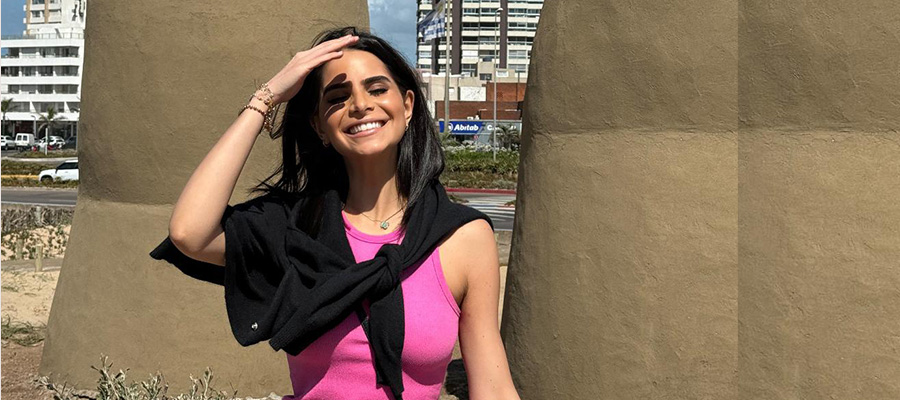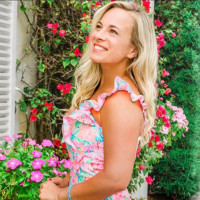
Alide Flores Urich Sass began having excruciating periods at 15. She often couldn’t move and spent days at a time in bed. It hurt to go to the bathroom. Her sole comforts were large doses of ibuprofen and a plastic bag of hot water pressed against her weary body.
“I told my gynecologist here in Mexico how bad it hurt, and he told me it was normal. That’s just how my body worked,” Alide said. “I continued to suffer, and it got a lot worse throughout the years.”
A turning point occurred in December 2023, 12 years after that first painful period as a teenager.
“I woke up on my bathroom floor. I’d fainted and vomited all over because of the pain,” Alide said. “I told my gynecologist what happened and insisted that something wasn’t right. He did an MRI and determined that I likely had endometriosis. I was about to go on a trip. He told me that when I got back in January, he was going to have to do surgery.”
While Alide was happy that she was heard this time, this was the same gynecologist who’d dismissed her pain for a decade.
“I didn’t trust him anymore,” she said. “I’d always explained my symptoms to him, and he never did anything. So I sought a second opinion from another gynecologist, and he said he’d have to do a laparoscopy because he thought I had stage IV endometriosis. He also suggested that I freeze my eggs as soon as possible because he didn’t think I’d be fertile much longer. He said based on the level of one of my hormones, he’d have guessed I was 45 years old and not 27.”
Alide had surgery in January.
“He said the surgery was very successful. However, he saw some endometriosis near my rectum and nerves that he didn’t want to touch,” she said. “He was afraid of the consequences for me if he didn’t do it right, so he took the most he felt he could.”
Two weeks later, Alide began the process of freezing her eggs. She did two rounds, freezing a total of 10, but had to stop there. She was in pain again. A lot of pain.
“I went back to my gynecologist who’d done the surgery. He told me the pain was normal, that I just needed to be patient and give it a couple of months,” Alide said. She left his office, giving him the benefit of the doubt since he’d discovered the endometriosis in her after her previous gynecologist hadn’t. But the symptoms worsened.
“I was bleeding 23 days out of the month. I had really bad cramps. I was taking painkillers to get through the day. I’m an active person but could hardly walk. I’d try to go for a morning run but would come back limping two minutes later. All of this after surgery.”
And when she returned to him with this list of symptoms?
“He told me nothing was wrong with me. He said he’d done an excellent surgery, it was out of his hands, and I should see a holistic doctor because the pain was in my head,” Alide said. “I left his office, went into the restroom, and cried. He was my doctor, the one who did the surgery, and now he was dismissing me. I was devastated.”
Knowing that endometriosis was the source of her pain, Alide searched for an endometriosis specialist. This past September, she was referred to one in the U.S. by a woman who had a similar severe case of endometriosis and was also dismissed by her doctors.
“I owe her a great debt,” Alide said. “Her support deeply shaped my understanding of the importance of having empathetic guidance when navigating such a critical health condition.”
The specialist confirmed Alide’s pelvic pain and every other symptom, and he performed successful surgery on her two weeks later.
“He found endometriosis on my nerves, rectum, bladder, ovaries, kidneys, posterior cul-de-sac, and fibrosis on my bladder wall—I was invaded everywhere,” Alide said. “The day before my surgery, I couldn’t even stand up. I’d been on such high doses of painkillers that I went through a couple of weeks of withdrawal when I went off them. Now, any pain I have is very, very mild, and Tylenol takes care of it. I feel great.”
The surgery may have also restored her fertility.
“He told me after the surgery that I’m perfectly capable of carrying children,” Alide said. “I told him what the doctors in Mexico had said, and he said, ‘Well, that’s their opinion. But I’m telling you that you’re clean and perfect, and the day you want to have kids, you will be able to conceive.’”
Alide took a break from her job as an international affairs consultant to share her story with EndoFound because “other women going through this need a companion on this journey.”
“What I went through was a very isolating time in my life,” Alide said. “People close to me, including doctors, didn’t understand the pain I was in. I pushed myself to do things because I didn’t want the pain to dictate my life. I became a slave to painkillers. I doubted myself. The disease affected me mentally and physically. Women who’ve experienced this need to listen to their bodies, trust themselves, and be their own advocates. They also need to know they aren’t alone and don’t need to go through it alone.”
Alide also has a message for those who dismiss women with this horrific disease.
“I think if people would take the time to try to understand the pain, they’d be more empathetic,” she said. “If you know someone who has endometriosis, please know that their pain is real. They aren’t exaggerating. Be there for them. They deserve it.”
*Patient stories submitted to EndoFound.org are the patient's views, not necessarily those of the foundation. All testimonials are from real patients, may not reflect the typical patient’s experience, and are not intended to represent or guarantee that anyone will achieve the same or similar results.









